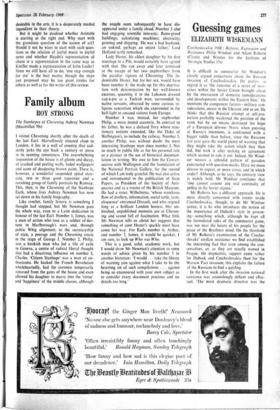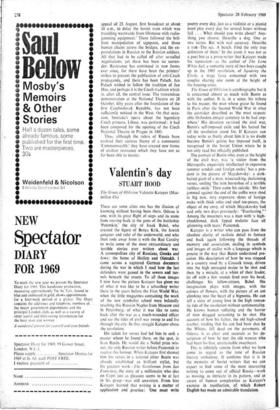Guessing games
ELIZABETH WISKEMANN
It is difficult to summarise Mr Windsor's closely argued conjectures about the Russian invasion of Czechoslovakia. He prefers to regard it as 'the outcome of a series of near- crises within the Soviet Union brought about by the interaction of domestic considerations and developments within the Eastern bloc.' He mentions the component factors—military con- siderations, unrest in the Ukraine and so on. He thinks that this Russian attempt at self-pro- tection probably weakened the position of the USSR but by no means destroyed the hope of a European detente. NATO, when guessing at Russia's intentions, is confronted with a bigger riddle than before, since the Russians last year gave the world plenty of warning that they might lake the action which they then did, but took it after making an agreement which seemed to rule it out. Indeed, Mr Wind- sor weaves a splendid pattern of paradox punctuated with question-marks. Have we more détente to expect, or more crises, and in which order? Although, as he says, the contrary view is widely held, Mr Windsor concludes that 'one cannot assume any real continuity of policy in the Soviet regime.'
Mr Roberts has a different approach. He is more directly concerned with events inside Czechoslovakia, though, to do Mr Windsor justice, it is he who introduces the notion of the importance of Dubcek's style in govern- ing—something which, although he kept all the formulated rules of the communist game, was too near the hearts of his people for the peace of the Brezhnev mind. On the threshold of Mr Roberts's examination of the Czecho- slovaks' civilian resistance we find established the interesting fact that even among the con- servatives, or, as they are usually named in. Prague, the dogmatists, support came rather for Dubcek and Czechoslovakia than for the Warsaw Pact invasion; this explains the failure of the Russians to find a quisling.
In the first week after the invasion national resistance was astonishingly defiant and effec- tual. 'The most dramatic directive was the
appeal of 23 August, first broadcast at about 10 a.m., to delay the Soviet train which was travelling westwards from Olomouc with radio- jamming equipment.' There followed the bril- liant manipulation of signposts, and those human chains across the bridges, and the ex- postulations in Russian to the Russian soldiers. All that had to be called off after so-called negotiations, yet there has been no surren- der. Resistance has continued in new forms ever since, for there have been the printers' strikes to prevent the publication of anti-Czech propaganda, and there has been Palach. Jan Palach wished to follow the tradition of Jan Hus, and perhaps it is the Czech tradition which is, after all, the central issue. The tremendous demonstration at the National Theatre on 28 October, fifty years after the foundation of the first Czechoslovak Republic, has not been sufficiently noticed in the West. On that occa- sion, Smetana's opera about the legendary Czech princess, Libuse, was performed: it had been composed for the opening of the Czech National Theatre in Prague in 1881.
Thus, although the rulers of Russia have evolved their curious theory of a communist `Commonwealth,' they have created new forms of civilian resistance which they have not so far been able to master.



































 Previous page
Previous page